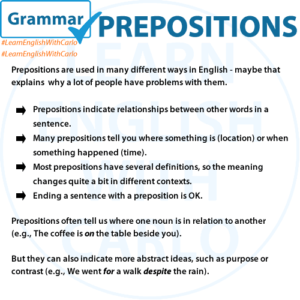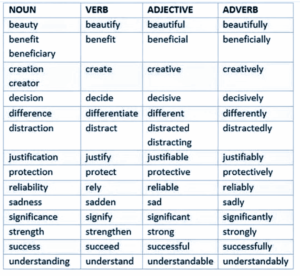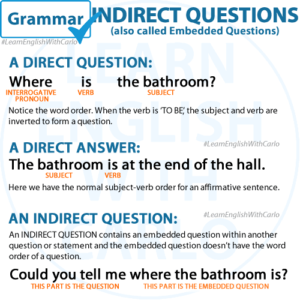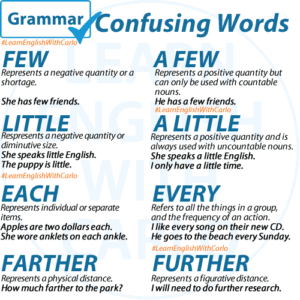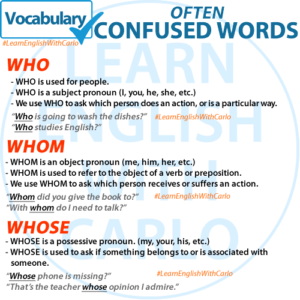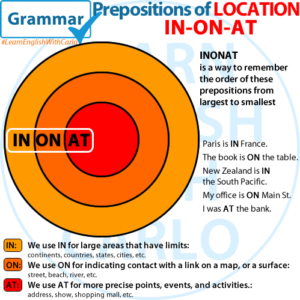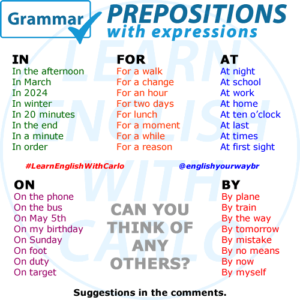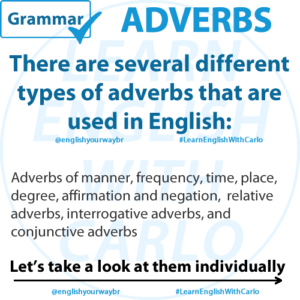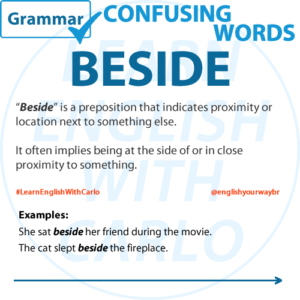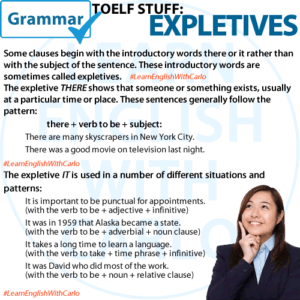Types of Prepositions The different types of prepositions are used to provide us with different information with regard to time (prepositions of time), place (prepositions of place), and direction (prepositions of movement). Besides these three, there are others: prepositions of manner and prepositions of cause and reason. Time: We’ve been working since yesterday.Direction: Go to …
Category: INSTAGRAM
Images I've posted to Instagram
Permanent link to this article: https://englishyourway.com.br/grammar-prepositions-2/
Sep 10
WORD FORMS
Welcome to our guide on how words can take different forms as nouns, verbs, adjectives, and adverbs! Many words in English change form depending on their role in a sentence, and understanding these transformations is key to mastering grammar and building vocabulary. Here you’ll find tables that show how specific words change across these categories, …
Permanent link to this article: https://englishyourway.com.br/noun-verb-adjective-adverb/
Sep 07
Indirect Questions
Indirect questions are a polite and often more formal way of asking questions. They differ from direct questions in their structure and use. Let’s break down what indirect questions are, how to form them, and provide examples to illustrate their use. What Are Indirect Questions? Indirect questions are questions embedded within statements or other questions. …
Permanent link to this article: https://englishyourway.com.br/indirect-questions/
Permanent link to this article: https://englishyourway.com.br/grammar-adjectives-that-quantify/
Sep 01
Who, Whom, and Whose
These three words are often confused. Here’s a brief explanation of the differences between “who,” “whom,” and “whose”: 1. Who: 2. Whom: 3. Whose: Usage Tips: Examples: Understanding these differences will help you choose the correct word in various contexts. Practice using them in sentences with the QUIZ below!
Permanent link to this article: https://englishyourway.com.br/who-whom-and-whose/
Aug 31
PREPOSITIONS OF LOCATION: in, on, at
Prepositions of location are essential in English as they help us describe where something or someone is located. Among the most commonly used prepositions are IN, ON, and AT. While they may seem similar, they are used in specific contexts to indicate different types of locations. Let’s explore how to use each one correctly. 1. …
Permanent link to this article: https://englishyourway.com.br/prepositions-of-location-in-on-at/
Aug 30
GRAMMAR – PREPOSITIONAL PHRASES
Here are some common prepositional phrases, also known as Collocations with prepositions. Prepositional Phrases for Time: Prepositional Phrases for Location or Movement: Prepositional Phrases for Cause or Reason: Prepositional Phrases for State or Condition: Prepositional Phrases for Manner or Degree: PREPOSITIONS with expressions INIn the afternoonIn MarchIn 2024In winterIn 20 minutesIn the endIn a minuteIn …
Permanent link to this article: https://englishyourway.com.br/grammar-prepositional-phrases-2/
Aug 29
Grammar – Adverbs
Permanent link to this article: https://englishyourway.com.br/grammar-adverbs/
Aug 26
CONFUSING WORDS – Beside vs. Besides
Beside:“Beside” is a preposition that indicates proximity or location next to something else.It often implies being at the side of or in close proximity to something. Examples:She sat beside her friend during the movie.The cat slept beside the fireplace. Besides:“Besides” is an adverb or a preposition that has several meanings:In addition to or apart from.Moreover …
Permanent link to this article: https://englishyourway.com.br/confusing-words-beside-vs-besides/
Aug 25
GRAMMAR – Expletives
Some clauses begin with the introductory words THERE or IT rather than with the subject of the sentence. These introductory words are sometimes called expletives. The expletive THERE shows that someone or something exists, usually at a particular time or place. These sentences generally follow the pattern there + verb to be + subject: There …
Permanent link to this article: https://englishyourway.com.br/grammar-expletives/

